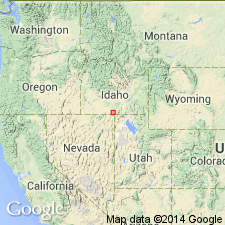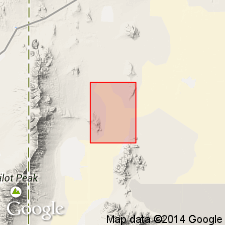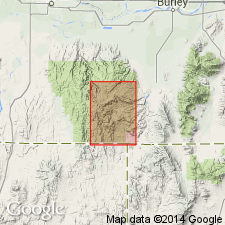
- Usage in publication:
-
- Trapper Creek Formation*
- Modifications:
-
- Named
- Dominant lithology:
-
- Limestone
- Sandstone
- Siltstone
- AAPG geologic province:
-
- Great Basin province
Summary:
Named for Trapper Creek, Cassia Co, ID in the Great Basin province. Type section is a composite of: 1) lower part measured in NW1/4 sec 20, T15S, R20E, Mahogany Butte quad; and 2) upper part measured in S1/2 SE1/4 sec 9, T15S, R20E, Severe Spring quad (graphic column). Composed of medium to dark brownish-gray, very fine grained, medium- to thick-bedded, fossiliferous limestone (packstone to lime-mudstone) alternating with buff, calcareous siltstone, and very fine grained sandstone. Forms imposing cliffs. Is 271 m thick at type. Gradationally overlies Badger Gulch Formation (newly named). Underlies Grandeur Tongue of Park City Formation. Of earliest Leonardian, Early Permian age. Has abundant brachiopods, scaphopods, bellerophontid gastropods, bryozoans, crinoids. Deposited in rapid shallowing marine waters. Contains lower Leonardian Zones 1 and 2. Lower part indicates transition from deep water of Badger Creek to shallow water of upper Trapper Creek.
Source: GNU records (USGS DDS-6; Denver GNULEX).

- Usage in publication:
-
- Trapper Creek Formation*
- Modifications:
-
- Areal extent
- Overview
- Dominant lithology:
-
- Limestone
- Dolomite
- Sandstone
- AAPG geologic province:
-
- Great Basin province
Summary:
Mapped at Lemay Island in southwest part of quad, Box Elder Co, UT in the Great Basin province. Overlies Badger Gulch Formation. Conformably underlies Grandeur Formation. Rocks assigned to Trapper Creek Formation in this quad were previously designated "Permian undifferentiated rocks." Is correlated with the upper part of the Pequop? Formation in the Pilot Range. Is a resistant thin-to thick-bedded, sandy and cherty limestone and dolomite. Thick beds of gray bioclastic (fragments of brachiopods, crinoids, bryozoans, and fusulinids) limestone are interbedded with 1) thin-bedded limestone containing quartz silt and fine sand, 2) brown, laminated sandstone and calcareous sandstone, 3) medium- to thick-bedded, gray silty limestone, and 4) gray-brown silty dolomite. Chert nodules and stringers occur throughout. Soft-sediment folds occur in most of formation. Top 66 ft is mostly bioclastic limestone. Top of formation placed at top of bioclastic limestone. Permian age. [Lithologic description of formation in this quad is different than description of it in Cassia Mountains.]
Source: GNU records (USGS DDS-6; Denver GNULEX).

- Usage in publication:
-
- Trapper Creek Formation*
- Modifications:
-
- Overview
- AAPG geologic province:
-
- Great Basin province
Summary:
Mapped in the central and west-central part of quad, Cassia Co, ID in the Great Basin province, where it is in gradational contact with the older Badger Gulch Formation of Early Permian age. Upper contact is with younger Grandeur Tongue of Park City Formation. Is 270 m thick. Forms prominent ledges and cliffs. Assigned an Early Permian age. [See also Stricker 1 quadrangle.]
Source: GNU records (USGS DDS-6; Denver GNULEX).
For more information, please contact Nancy Stamm, Geologic Names Committee Secretary.
Asterisk (*) indicates published by U.S. Geological Survey authors.
"No current usage" (†) implies that a name has been abandoned or has fallen into disuse. Former usage and, if known, replacement name given in parentheses ( ).
Slash (/) indicates name conflicts with nomenclatural guidelines (CSN, 1933; ACSN, 1961, 1970; NACSN, 1983, 2005, 2021). May be explained within brackets ([ ]).

